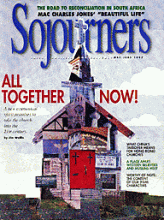"Please. Would you close the door? We dont want the truth to get out." So Douglas John Hall addresses his undergraduates at the beginning of "The History of Christian Thought," a course that attracted more students of literature and philosophy than theology at Montreals McGill University.
Comments such as this do not fly unnoticed, generating amusement for some, while bewildering others. At a time when its considered more hip to "deconstruct" the major texts of the Western Canon than to experience them as cohesive works of beauty, Halls sense of humor sounds hopelessly romantic, if not absurd.
So, if the artsy agnostics crowd outnumbers the so-called "religious" in a class on theology, then why isnt anybody reading it? Harper Publishing has estimated the market for serious theology in North America at around 12,000 people, and with the rising popularity of more emotive forms of worship, many Christians fail to see why they would want anything more than a well-thumbed King James on their nightstand. Yet Hall is emphatic about the increased relevance of theology in our time, even if he doesnt expect to see his royalties match Deepak Chopras.
"I would never exchange the writing of some musicologist for a Bach partita or fugueplease!" he told me, in a voice recalling the rumbling of a distant summer thunderstorm. "However, if Im going to understand as best I can the Bach partita or fugue, I had better read some musicology.
Read the Full Article
